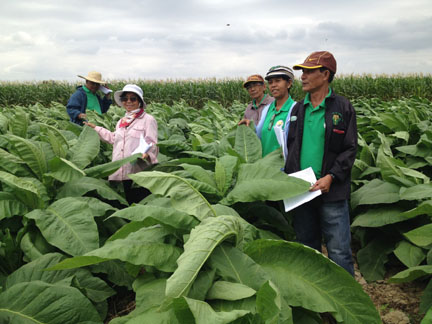News Articles
NTA resolute in its commitment to quality tobacco production
FARMERS who produce good quality tobacco expect a ready market at favorable prices.
This has been a consistent reminder by the National Tobacco Administration (NTA) for every cropping season, which usually runs from as early as September to late April the next year.
NTA Administrator Edgardo D. Zaragoza has stressed the need for farmers to produce high quality leaf. He kept on reminding them that while producing low-quality leaves may be inherent with the plant, this should not be aggravated by bad production, curing, and handling practices.
Low-grade tobacco leaves, or even usable rejects, might be as good as waste now. This is so as the uniform tax rates of all types of cigarettes per pack took effect this year. According to the new Sin Tax Law (or Republic Act 10351), the tax on tobacco products, both upper and lower price ranges continue to rise at their respective rates from the effectivity of the law in 2013 until 2017 when all types of tobacco products are taxed P30 per pack. |
 |
With this development, tobacco companies upgraded the quality of their product to match increased prices and, therefore, would only want the best quality leaves for their products to be competitive in the market. They would only purchase the best quality leaves, and unlike years before, low grade/reject tobacco might no longer be bought during this trading season.
It may be noted that during the Tripartite Conference that approved the latest floor price increase in 2015, the farmers agreed to a status quo in the lower grade prices for Virginia and Burley to discourage production of low quality tobacco leaves, which was one of the conditions set by traders in increasing the prices for top grades.
Without the market for the low grades, reject tobacco production will no longer be profitable. The agency addresses the problem through its market-driven quality tobacco production programs, with such critical interventions as the Irrigation Support Program and the Tobacco Contract Growing System; the education and information drive of each branch office before the start of the tobacco season that centers on high quality requirements, tasking extension workers to give invaluable advice and assistance to farmers to ensure that the tobacco grown will be acceptable; the release of the Tobacco Production Manuals (Virginia and Burley) prepared by the Techno Updating Task Force, which are expected to boost the education campaign for quality tobacco production; and continuing emphasis on Good Agricultural Practices and the implementation of Quick Response System for early detection of pests and diseases in the farm. Campaign against non-tobacco related materials is as strong as ever throughout the cropping season until the trading of the tobacco leaves.
Zaragoza said that the prospect in the market continues to be bright. "As long as the industry addresses the quality as demanded by the export market or specific quality demanded by domestic manufacturing, we will sustain the viability of the local tobacco industry," he added.
Tobacco is still a reliable cash crop, particularly in Northern Luzon.
Despite the challenges, such as anti-smoking campaigns and related legal frameworks, the tobacco industry in the country still has a promising future, that is, if good tobacco quality is sustained. (Neyo E. Valdez)






